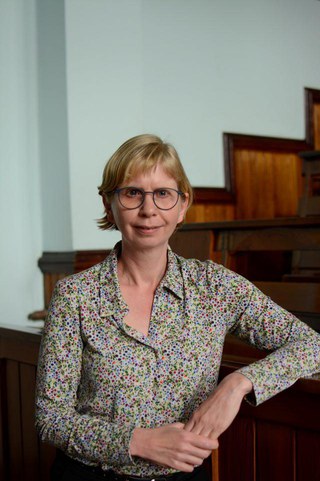Prof. dr. Ellen Wayenberg

Question & answer
What is your research about?
My research revolves around the way governments function. I focus on their interventions that directly involve citizens (such as a compulsory curfew in times of crisis or the promotion of vocational education) but primarily on their managerial choices concerning the organisation and workings of the government apparatus (such as more digitisation or enlisting expert knowledge).
I am particularly interested in the design and evaluation of the workings of the government. I want to know more about how public issues and choices are made, whether they are really innovative, what impact they (can) have and why (not).
Why is your research socially relevant?
Governments have a major impact on our lives. Everyone comes into contact with them. Citizens (and certainly the younger generations) need to be aware of this, but they also need to know that they can play a role and be responsible for policy and governance and how this can be brought about.
Where did the interest in that subject come from??
“Life can only be understood backwards, but it must be lived forwards." With this, the Danish philosopher Kierkegaard also made an interesting reflection on governance. After all, government officials have to move forward every day, realising new policies and governance, while striking the best possible balance with themselves and their surroundings. Sometimes this will work out, resulting in resolved issues and satisfied citizens, but other times it will not.
Whichever way, the rest of their lives in the public eye will benefit from a thorough understanding of how policy and governance work. And it is precisely to such a learning and knowledge generation that I am happy to contribute.
What have you mainly studied in practice?
Much of my empirical work encapsulates what happens at and around local government. Cities and municipalities have a unique position that makes them vital and vulnerable at the same time. As the outermost layer of the imaginary governmental lasagne, they are close to the citizen. While they pick up social cues and needs before others do, at the same time, other actors/administrations can greatly influence their room for action and capacity.
Ln their policies, local governments are constantly seeking to strike a balance between their strengths and weaknesses. Governments at other levels of government are also challenged in this way, something to which I have paid increasing attention in recent years. And my work encompasses various policy areas, both within and outside of Belgium/Flanders.
Therefore, scientifically-based evidence of the workings of government is crucial. Because today, people are (too) quick to judge the government's actions, which is not always justified. Just as much as individual interests and frames of mind overrule a collective reflex that is at the very core of (our) democratic government.
What do you still hope to achieve in your academic career?
Through my work, I would like to contribute to the acquisition of knowledge and skills regarding public administration and policy, both in Belgium/Flanders and worldwide. Not only with our public administration and management students but also with citizens who, for professional or personal reasons, want to become better at this.
Sharing scientific know-how on theoretical constructs and empirical findings is crucial. As is providing useful tools and instruments to carry out thorough policy and public administration analyses and assessments.
What is the first thing you do when an unexpected slot opens up in your agenda?
Imagine what my loved ones might be doing and smile at possible scenarios.
What is your hidden talent?
I see it emerging more and more in my two sons, which is wonderful! :-)
How would colleagues describe you?
I’m happy to leave that to them. :-)